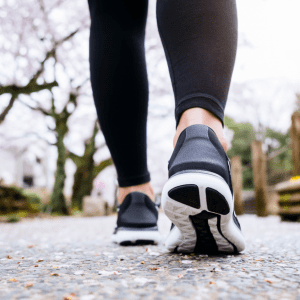It’s Not You, It’s Them: The Real Reasons Why People Struggle to Be Active
Maybe you’re a busy stay-at-home mom with a schedule that is mostly dictated by school schedules, nap times, and extracurricular activities. Or, you’re a full-time employee who is stuck at a desk all day. Or, you’re even a virtual employee who has yet to return to the office. Either way, more and more of us are struggling to stay active and fit movement into our daily schedules.
Most people quickly jump to blame themselves for a lack of motivation or an inability to “just get it together.” But, what if laziness or lack of self-control is not to blame? Because in my experience as a Health Coach it usually isn’t either of those things.
The Correlation Between Habits, Energy & Activity
Our daily habits have a significant impact on our energy levels. In turn, our energy levels have a significant impact on our motivation and ability to be active. If you are physically and mentally depleted, your likelihood of adding daily activity to your schedule is slim at best.
This is precisely why Health Coaches spend so much time discussing habits and routines with clients. Because whether you realize it or not, the habits you build are always taking you somewhere. The real question is, are they taking you where you want to go?
So before you beat yourself up over your lack of desire to go to the gym after work or a long day keeping your little humans alive, let’s look at the daily habits that are directly connected to your energy levels. The ones that may be undermining your efforts to be active. And let’s look at what you can do to improve them. Thus increasing your physical ability and likelihood to be active. Because when you are physically depleted it doesn’t matter how much willpower you have, your lack of energy will win almost every time.

Daily Habits Linked to Energy Levels
1. Drinking Sufficient Water
The golden rule here has changed. So, you may need more water than you think. It used to be “8×8” — meaning 8 glasses of 8 ounces. However, a person’s size and activity level weren’t taken into consideration with this. The new, generally accepted standard is 2/3 of your body weight in ounces. So for example, if you weigh 150lbs you should be drinking 100oz daily. You’ll also want to adjust that number based on how often you workout since you are expelling water when you sweat. You should add 12 ounces of water to your daily total for every 30 minutes that you work out.
2. Getting Enough Sleep
Lack of sleep is one of the biggest culprits that can undermine your ability to be active. While we all know that getting 7-9 hours of sleep every night is recommended for optimal health and peak performance, few of us actually achieve that on a regular basis. However, arguably if there is just one area of health that you should focus on improving, getting sufficient sleep would be it. Developing a sleep routine and practicing good “sleep hygiene” can tremendously improve both the quantity and quality of sleep you are getting. This includes things like: going to bed at the same time every night, taking a warm bath or shower in the evenings, reducing caffeine intake (especially later in the day), adjusting room temperature, lighting, and noise levels in your bedroom to make it suitable for sleep, eliminating screen time at least 30-60 minutes prior to bedtime, and listening to a guided meditation or soothing music. The key is here is to find a routine that suits you. Find one that you actually enjoy doing so that it eventually becomes a natural, soothing rhythm with which you close out your day.
3. Eating Sufficient Meals
Not consuming enough calories or eating regular meals can have a significant effect on your daily energy levels. Blood sugar levels need to be maintained to avoid that mid-day slump so many of us experience. When you’re hangry and your energy levels are dipping due to a need for food, you won’t have enough energy to be active. Eating consistent, nutrient-dense meals that include all of the various food groups (especially protein) can help keep your energy levels stable and sustained throughout the day.
4. Prepping the Day Before
Doing small things like setting out your workout clothes the night before, packing that gym bag to take with you to work so you don’t have to stop at home to change first, making a nutritious, energy fueling lunch the previous evening, etc. are all seemingly inconsequential or small tasks that actually hold significant power. And, they can greatly increase your chances of achieving your goals. Find even the littlest of ways to make things easier for yourself and remove obstacles that you know will hinder you from being active.
5. Never Underestimate the Power of Simple Movement
In my experience working with clients, somewhere along the line, most of us were taught that unless you are sweating and severely out of breath that it “doesn’t count” as exercise. While there are certainly health benefits to more high-intensity workouts, that isn’t the only type of exercise that counts. In fact, for most people, this type of exercise is neither attainable, sustainable and often increases injury risk. This is why the focus should be less on “exercise” and more on “joyful movement.” Find a form of movement that you actually enjoy. It will exponentially increase your chances of successfully sticking to routine workouts because it no longer feels like an additional chore or a form of punishment to your body.

6. Set 250 Steps Per Hour Reminders
Using a Smart Watch or Fitness Tracker like a Fit Bit to remind you to move at least 250 steps every hour can have a significant impact on your overall daily steps taken and have an even greater positive effect on your health. Sitting all day increases the risk of obesity, diabetes, hypertension, inflammation, and atherosclerosis. All of which sounds pretty dismal, especially considering many of today’s jobs require us to be nearly glued to our computer screens. Thus making the time and setting reminders to take that tiny two-minute break to walk 250 steps each hour is small yet extremely significant.
7. Dedicate Time to Mental Health
So often our focus on “being healthy” centers around exercise and nutrition, which are certainly large contributing factors on a person’s health, but often overlooked is the equally significant aspect of mental health. Just like with lack of sleep or food, when we feel emotionally or mentally depleted, being active becomes more challenging. Thus is it of utmost importance to take care of our mental state just as much as it is our physical state. This will look different for every person and the circumstances they currently find themselves in. Taking care of your mental health may look like increasing self-care activities, daily positive affirmations, going to counseling, meditation, and decreasing negative self-talk, etc. Finding what works for you and honoring what is needed in the current season you are in is what is most important.
The Biggest Take Away
Don’t be so quick to assume that your lack of daily activity is your fault due to an absence of self-discipline. Instead, take some time to discover what your waning energy or motivation might be rooted in. And remember that you can’t shame your way into better behavior.
About the author:
![]()
Emily Robinson is the founder of Abide Health Coaching. She is a certified Health Coach (CHC) and Yoga Therapist (CYT-500). Emily has worked with both private clients and in small groups; addressing specific health concerns such as: MS, cancer, alcohol addiction, eating disorders and Parkinson’s. She now specializes in working with clients who struggle with disordered eating and negative body image. Emily provides support for those who’ve completed treatment for an eating disorder who are reengaging in normal life; to help them maintain their recovery. She is partnered with the Anchor Wellness Center

